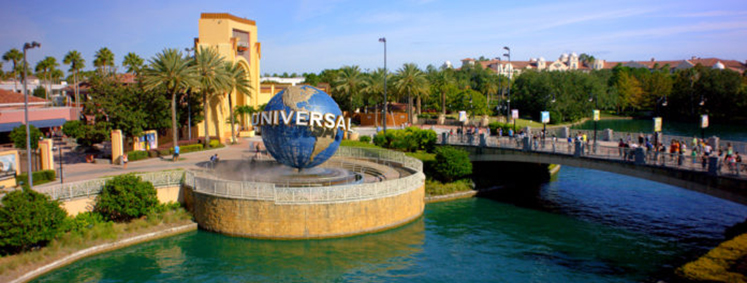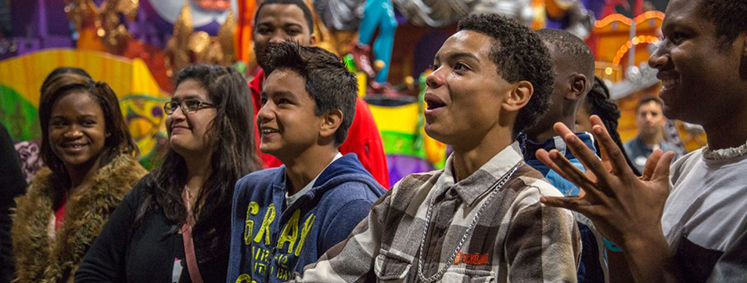When unemployment is 3 percent and your company is surrounded by competitors eager to poach your best people, it isn’t enough to just pay well. You also have to maintain a reputation for being a stellar employer, according to Bill Davis, president and COO of Universal Orlando, the vacation destination that is home to three theme parks, six hotels and Universal CityWalk.
Davis points to a multi-pronged strategic approach to recruitment that involves investment in culture, innovation, education and the local community. Situated in a city that has fast become a burgeoning, business-friendly hub for innovation and creativity, Universal Orlando Resort aims to offer prospective team members the promise of an exciting career with a growth company that values more than just profits. As Davis explains in the following interview, when your people truly believe you care about them—and the world you both live in—they stay with you.

You’ve maintained Orlando is the ideal city for companies in the tourism industry. There are other cities with robust tourism markets. Why Orlando above all?
You want to be here for a number of reasons. One, Orlando has great infrastructure. Two, we have a well-educated, motivated workforce. Three, we have a world-class airport, which makes it easier for people to get in and out of our area. Four, we have the second largest convention center, which draws a lot of people. Orlando is also considered the number one family destination in the U.S., if not the world, so right now, this city is kind of like the Superbowl of our industry, where the big game is, and not only are we here, but some of our industry’s best vendors are located here as well. And of course, the weather isn’t bad, either.
Given the low unemployment rate, what does Universal Orlando do to stay competitive in the war for talent?
I don’t think it’s one specific thing—it’s a number of things. When Tom Williams [chairman and chief executive officer of Universal Parks & Resorts] came out here from California in 1988, he had a particular philosophy on what he thought the company’s culture should be. Obviously, we need to offer competitive compensation packages, but a key item for us is the growth potential and career tracks people see when they come to work for us. They can see we are a growth company. Bright people in any industry generally want to be with companies that are growing. And we have a great parent company in NBCUniversal and Comcast. Since we’ve become part of the company, they have just been terrifically supportive of everything we’re doing down here.
How would you compare what we’re seeing today with other periods of low unemployment that you’ve lived through?
I would say it’s very competitive. The unemployment rate here in Orlando is 3 percent. It’s very competitive at just about at every single level of people we hire, whether it’s a brand new person in the labor pool getting their first job to people who are engineers or PhDs. But we seem to be doing well.
Is poaching by nearby competitors an issue?
They do try. But people like the culture once they get here and they really like the growth potential they see for their careers. This is a pretty cool place.
What are some of the elements of a great corporate culture?
It starts at the top. Our entire leadership team cares about making sure our team members have the resources to do their jobs. We all care about making sure our team members have the tools necessary to do the work they’re being asked to do. There’s nothing worse, in my opinion, than asking someone to hammer a nail and then giving them a nail and a screwdriver. It starts at the top and then it kind of permeates down to everyone else.
Every year, we do what we call our “TSAT,” or team satisfaction surveys, and of the approximately 25,000 team members, 75 to 80 percent take the survey and give us feedback. They tell us you’re doing good here or we’d like a little more of this or less of that, and where possible we respond to that feedback. So our team members feel, rightfully so, that they have a voice in how they’re able to do their jobs.
We also make sure new hires are a good fit with our culture. We’re looking for people who have a shared focus on the number one job we have, which is taking care of our guests. We believe if the team members have the resources to do their jobs, they’re going to be happier. If they’re happier, they’re going to take care of our guests, so our guest satisfaction is going to be strong—and quite frankly, it is very strong—so at the end of the day, we’re going to have a successful company.
Where do you find your candidates? Do you have partnerships in place with University of Central Florida and other schools?
We absolutely do—but it’s not only at the college level. When Universal came to Central Florida a little over 30 years ago, it was very important to Tom—and I know it’s very important to NBCU and Comcast, as well—that we are a part of the community and being part of the community means we have to be part of the educational side of the community as well. Our kids and our grandchildren are going to these schools, so we as a company have invested a lot of time, effort and, frankly, money in helping the schools in the Central Florida area, whether it’s elementary school or middle school or high school or the Rosen School of Hospitality Management at UCF. We have a number of people on advisory councils at UCF and I, myself, am on the advisory council at Stetson [University in DeLand, FL].
Another thing we do, and this is a little unique for our industry, is that we have an onsite operation that we call the Universal Education Center. It’s a program for 40 to 45 young people who may benefit from an alternative approach to education. They come here and basically go to school for half a day and then work a few hours. They also have a mentor, one of our full time directors or supervisors. A number of graduates of the UEC program work here full time now, which is terrific.
We have several other programs designed to reach kids at all levels. The Art of Tomorrow program gets us into the middle schools. Those students have the opportunity to work next to our creative team and our entertainers. They can look for career opportunities or just be mentored by people in the business if they have that kind of interest, and they can then stay all the way through high school. We also have programs at UCF and Valencia College and a number of those folks are working for us now. And we have an apprenticeship program for people who want to work in the trades.
So we’re investing in the education of a whole bunch of people and some end up working here and some don’t. But we’re a part of the community. Beyond employing people, we’re trying to make our community stronger. That actually helps attract people from other places to our community.

Middle school students work with Universal Orlando’s creative team through its Art of Tomorrow program.
Universal’s Wizarding World of Harry Potter was considered one of the greatest innovations in theme park history. It’s hard to keep topping yourself. How do you continuously innovate to keep things exciting?
Our industry has been pretty innovative. Between the Universal Creative team, which develops our attractions, to the people who operate the attractions to our guest service people and all our industry partners, we are always working to innovate. The Wizarding World of Harry Potter was definitely one of our high points – but the list continues to grow. Our latest attraction, which will open in June, is Hagrid’s Magical Creatures Motorbike Adventure, a thrilling coaster flight that we think is pretty special and is going to raise the bar even more.
I would say that this is perhaps the most exciting time in our company’s history. Innovative things are going to continue to come down the track, and we will adapt innovation from other industries, such as augmented reality, when they make sense for our industry.
What sort of new technology are you deploying?
A good example of something we did recently, was when we opened Volcano Bay, our new water theme park. We introduced TapuTapu, a wearable, that allows you to tap into and wait on a virtual line while you do other things, pay for things, get locker access – and more.
Technology is disrupting just about every industry. In what ways are IoT and AI disrupting tourism and hospitality and how is Universal Orlando staying ahead of that?
For us, technology is kind of a means to an end. What we’re in the business of is making sure we’re using all the available tools out there to create immersive experiences for all kinds of families. We are creating these experiences and its bringing families and people together to share an innovative, immersive experience that, frankly, is becoming less and less available out there in the world. We have a lot of people with their heads down looking down at their cell phones. When you come to our place you’re sharing experiences as opposed to everyone looking at their own little game. You’re sharing the experience of being immersed in a world – like The Wizarding World of Harry Potter – with your kids, grandparents, mom and dad or whatever the family unit is.
So you use high-tech in order to elevate the high-touch?
Yes. We’re adapting all kinds of different technologies and machines and innovative thinking from other areas to make sure that when you come to this world, you’re immersed and having a great time and creating memories that are going to last a lifetime.
I have a really wonderful job. I can leave my desk in the administration building and in less than five minutes, I can be in one of our parks and see families coming together, see young kids come in and, on a daily basis, literally fall down on their knees and kiss the ground. So I could be having a terrible day and I’ll tell my very able assistant, Kim, that I need a half hour or an hour and I’ll go to the park and then come back totally reinvigorated and thinking, wow, I have just a tiny little piece of making that kind of experience happen that that young lady or that young man or that family is going to have with them for the rest of their lives. That’s why I get up in the morning and that’s why I’ve been doing this for 40 or 45 years. Honestly, I think I have the best job in the world.
Originally published in Chief Executive Magazine on April 8, 2019.



